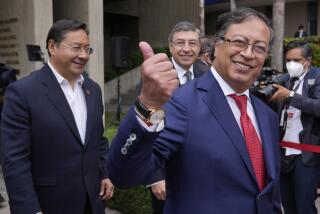‘Mengele’s Life Here Is a Fact,’ Chief Says to Skeptics : Dapper Brazilian Investigator Is Candid, Canny and Controversial
- Share via
SAO PAULO, Brazil — “The Tuma Show,” a movable feast in a crowded office building, is never punctual, always chaotic and often spectacular.
The host of the performance, which received its nickname from the reporters who witness it two, three or four times a day at no particular hour, is as improbable as his subject. Still, as Sao Paulo Federal Police Chief Romeu Tuma has talked this week, people have learned to listen.
Even before he began his pursuit of Josef Mengele, Tuma was the most famous policeman in Brazil. In 1978, he arrested Nazi war criminal Gustav Franz Wagner. In 1983, he arrested Mafia figure Tommaso Buscetta, who was extradited to Italy and turned state’s evidence, leading to a massive roundup last year of criminals in Italy and the United States.
Fixture on News
Now, Tuma is a fixture on the evening news, the canny and controversial unraveler of the astonishing saga of Mengele’s supposed peaceful clandestine life in Brazil and purported end by drowning six years ago. On Wednesday, there was no Tuma Show--and no Mengele news from police headquarters.
The 53-year-old son of immigrant Syrian merchants, Tuma is accessible, affable, unflappable and as patient as the saint to which the devout Roman Catholic says he prays: St. Jude, patron saint of hopeless causes.
He is the father of four sons, all of whose first names start with the letter R. His wife, Zilda, for whom he has been known to pen occasional love poetry, is the principal of a public elementary school.
In the week since police exhumed the body that may be Mengele’s amid nearly unanimous international disbelief, Tuma has assembled a sturdy argument that Mengele indeed lived in Sao Paulo state for some 18 years.
No Major Holes
Naysayers still abound, but none of them so far has been able to poke a major hole in Tuma’s detective work. “Mengele’s life here is a fact,” Tuma asserts, saying that it is up to forensic scientists to decide if the remains they are now studying are those of Mengele.
The dapper, mustachioed Tuma is fighting a nascent pot belly. He carries no gun and eschews bodyguards. As superintendent of the plainclothes Sao Paulo police charged with enforcing federal laws, he reports directly to the Ministry of Justice in Brasilia. People in this city, South America’s largest know him as o chefe --the chief.
“I am a professional,” said Tuma, who is portrayed here as the kind of incurable workaholic who gets results.
In his dealing with the press corps, swollen out of proportion in response to the Mengele revelations, Tuma has displayed a genius for public relations--and disorganization.
Tuma shows scheduled for 10 a.m. sometimes don’t start until noon. One encounter scheduled for 4 p.m. started at 2:30. At one session, Tuma said he could stay only for 10 minutes. An hour later he was still talking.
Talk, Talk, Talk
Tuma talks to anyone in his path from the instant he hits the 17th floor of federal police headquarters here from his office one flight up. He talks to reporters on the staircase, in the hall, in the doorway, and then--finally--to a jostling horde squeezed among as many as 15 television cameras representing networks around the globe.
It is possible to stand four feet from Tuma at one of the shows and not hear everything he says--there is so much racket and he speaks so quietly. Once Tuma has left, nervous reporters divide into language groups--Portuguese, English, Spanish, German--to compare tape recordings and decide exactly what he had said.
At a morning show Tuesday, Tuma talked of a mysterious “Santiago” and of a “Marcos” who could testify that they knew Mengele. Later, they both turned out to be a man named Norberto Glawe, who is sometimes called Santiago but never Marcos.
Tuma straightened out the confusion by handing around a deposition in which Norberto Glawe swears he cared for Mengele after the fugitive war criminal suffered a 1976 stroke.
Free of Accusations
Tuma has been a policeman for 33 years. He made his career, principally as an intelligence officer, in a feared political police force known as DOPS, its acronym in Portuguese. In times of dictatorship, the force was accused of brutality, political torture and other human rights abuses.
No accusations of violence or abuses have been made against Tuma, who became Sao Paulo commander of the force in 1977. When DOPS was dissolved in 1983 and its functions assimilated by the federal police, Tuma was promoted to head the expanded federal force in Sao Paulo.
By then, Sao Paulo realized it had a police chief who believed that detection and modern technology provided better information than prisoners who are pushed down flights of stairs. A local reporter even dared to ask him about torture:
“Torture must be condemned by civilized people for ethical and moral reasons,” Tuma responded. “Besides, it makes for inefficient police work.”
On Wednesday, there was no “Tuma Show” because the chief was testifying to a Senate committee in Brasilia about fraud against the Brazilian social security system by some administrators and doctors.
More to Read
Sign up for Essential California
The most important California stories and recommendations in your inbox every morning.
You may occasionally receive promotional content from the Los Angeles Times.













